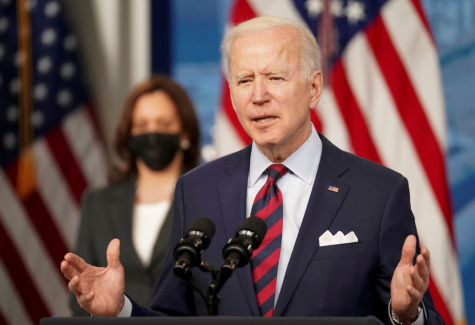A $15 Minimum Wage Should Not See the Light of Day
March 17, 2021
On Thursday, Feb. 26, the Senate Parliamentarian ruled that an increase of the federal minimum wage to $15/hr could not be included in the $1.9 trillion dollar COVID relief bill that passed in the Senate on Saturday, March 7. According to axios.com, since the relief bill was taken up through budget reconciliation (a process that allows the Senate to pass a bill with a simple 51 vote majority, rather than the 60 vote majority required to overcome a filibuster), the Senate Parliamentarian decided that the minimum wage provision was not “merely incidental” to the government’s finances, therefore making it ineligible to be included in the COVID-19 relief bill. Senator Bernie Sanders (D-VT), introduced an amendment to the relief bill which would increase the minimum wage bill, but that route appears dead-on-arrival, as it now requires 60 votes. In sum, the Democratic priority of increasing the minimum wage to $15 appears to be stymied, for now.
Campaigns to increase the minimum wage have accelerated in recent years, with major figures in the Democratic party joining the fight, including President Biden pledging to support a standalone bill increasing the minimum wage to $15. With the compelling emotional pleas for a “living wage,” supporting a minimum wage hike may seem like the obvious (or, to use the modern gold standard for any political decision, “empathetic”) position to take. Nevertheless, such a proposal fails on multiple fronts.
Instituting a federally-mandated minimum wage of $15 applies to all states equally, with businesses in the city of Boston forced to pay the same base salary to hourly workers as those in rural Mississippi. While the fact that living standards vary between Massachusetts and Mississippi is no surprise, it is nonetheless conveniently overlooked by advocates of an increased minimum wage. According to the US Bureau of Labor Statistics, the median hourly wage for workers from all occupations in Massachusetts in 2019 was $24.14/hr. That same year, the median hourly wage for workers from all occupations in Mississippi was $15/hr. According to the US Census Bureau, Mississippi had the highest poverty rate of all states in 2018, at a whopping 19.7%. The solution to poverty, according to advocates of a $15/hr minimum wage, would be for the federal government to mandate that businesses in the poorest states in the union pay workers their market-based median hourly wage as a minimum hourly wage. Far from creating a “living wage,” this is a recipe for pricing the poorest workers – those who are the intended beneficiaries of a minimum wage increase – out of the workforce.
These negative effects are not limited to just the poorest states. According to a projection from the Congressional Budget Office, the proposed minimum wage increase would lift 900,000 people out of poverty and reduce employment in the United States as a wholeby 1.4 million workers. It is no doubt that the lives of those who see their wages increase will improve, but if those benefits come at the cost of 1.4 million workers seeing their wages decrease to $0/hr, then perhaps the real-world consequences of such a proposal should take precedence over its proponents’ intentions.
Not even the most ardent advocates of a $15 minimum wage can escape these real-world consequences. Back during the 2020 Democratic Presidential primary, Senator Sanders, the most outspoken advocate for a $15 federal minimum wage, was drawn into a wage negotiation with some of his campaign staff. According to Newsweek, “Field organizers [for the Sanders campaign] say they make a salary of $36,000 annually but work 60 hours per week, which is an average of $13 per hour.” Sanders received criticism from his political allies and opponents alike for failing to pay his own staffers the $15 hourly wage that he made such a pillar of his campaign. In response, the Sanders campaign decided to reduce the hours that their field organizers work each week so that their hourly wage rose to $15/hr, rather than increase their pay for the same number of hours worked. As it turns out, economic realities do not particularly care about your political priors. They apply to both the utopian visionaries and realists alike, as Sanders learned the hard way.
In the end, no one is sanguine about the idea of a single mother of three working two or more jobs that pay $7.25/hr. I have no doubt that those who argue for an increase to the federal minimum wage are motivated by genuine intentions to improve the lives of those working minimum wage jobs. But when the real-world consequences of these intentions result in a single mother of three making $0/hr because the increased cost of her labor has priced her out of the workforce, the intentions of the proposal ought to take a back seat to its actual effects.











